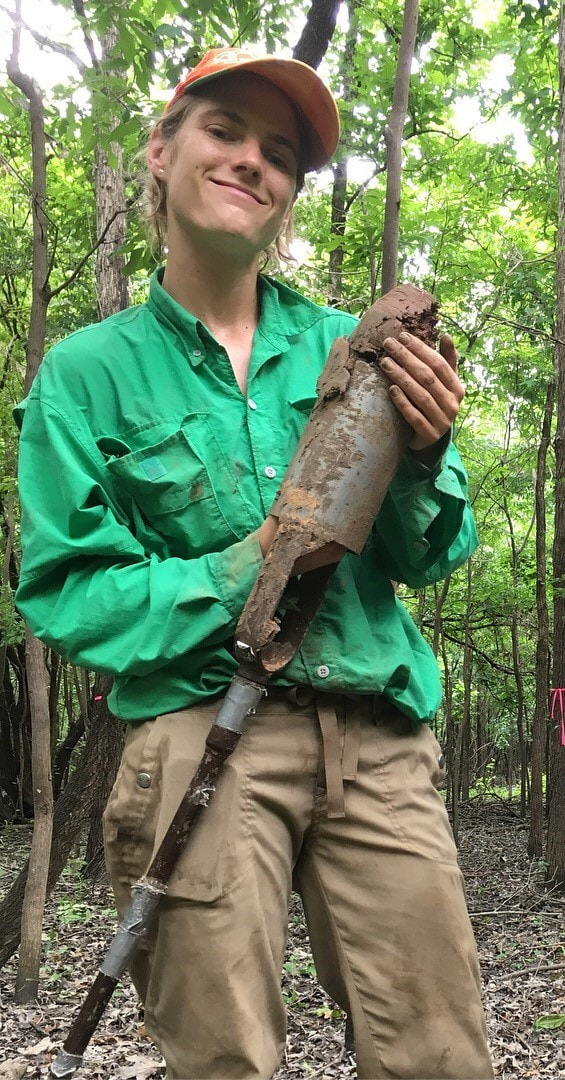To me ecohydrology is the study of how water shapes ecosystems and biological processes and how ecosystems and organisms affect hydrological processes in return. My first experiences in ecohydrology studying how oyster reefs altered the flow of water and affected the geomorphology of tidal creeks fell in the latter part of this definition.
What are your undergraduate and graduate degrees in?
I have a BS in Ecology and Evolutionary Biology from Tulane University and a MS in Marine Science from University of North Carolina at Wilmington. I recently defended my dissertation in the School of Renewable Natural Resources at Louisiana State University. I really appreciate the diversity of ecological systems that I have studied and I think that has given me a unique perspective.
How did you arrive at working in/thinking about ecohydrology?
My first introduction into ecohydrology was during my masters studying oyster reefs. My previous experiences working with birds and learning about ecological processes did not emphasize the intimate connection between ecosystems and water that is so obvious when working with immobile oysters. Sessile organisms like oysters are subject to local environmental conditions after they settle out of the water column and recruit to an oyster reef. The structure of the oyster reef alters the hydraulics of the flowing water to the general benefit of the oysters. The characteristics of the flowing water are in some ways much more important to the success of an individual oyster than other ecological processes such as predation and competition. This realization piqued my interest in the role water plays in shaping ecosystems and really got me started in the field of ecohydrology. This perspective also got me more interested in the world of plants.
What do you see as an important emerging area of ecohydrology?
Like other featured LEAFs, I think the further incorporation of the role of humans in hydrological processes is an important area of study. This is not necessarily an emerging field but I think better representation of humans and urban hydrology in models will be a productive area of work in the future. Secondly, I think a better understanding of rooting characteristics and the interaction between rooting and water uptake is an important and emerging field. Hopefully new technologies, machine learning, and satellite products will enable an improved understanding of this previously unobservable interaction. Lastly, I think it is really important that we better understand the potential fractionation of stable isotopes in soils. My dissertation research involved the use of stable isotopes of water to study water uptake in some heavy clay soils. Through this process, it became apparent that the continued, widespread application of stable isotopes to study water movement in shallow soils and water uptake requires a much better understanding of potential fractionation of the stable isotopes of water in all soil types.
Do you have a favorite ecohydrology paper? Describe/explain.
Rather than my favorite paper, of which there are many, I will offer up one of the most important papers for me in completing my dissertation. This was the review paper by Sprenger et al. titled “Illuminating hydrological processes at the soil‐vegetation‐atmosphere interface with water stable isotopes.” This paper provided an extensive and complete review of the application of stable isotopes in the critical zone particularly in shallow soils. It is a good foundation of our current knowledge of stable isotope transformation in shallow soils of upland areas and it taught me how to interpret soil water isotope data with regards to hydrological processes in shallow soils. From this review paper, I was able to form robust hypotheses about stable isotopes patterns in shallow soils of lowland areas.
What do you do for fun (apart from ecohydrology)?
Like most featured LEAFs, I really enjoy water activities. I have spent most of my time on the coast so I really enjoy diving, swimming, and sailing when I have the opportunity to do so. I enjoy exploring the swamps and coastal rivers of the northern gulf coast looking for critters and I also like to hike when I get out of the swamp. In New Orleans, I enjoy gardening and exploring local music venues and restaurants.

 RSS Feed
RSS Feed